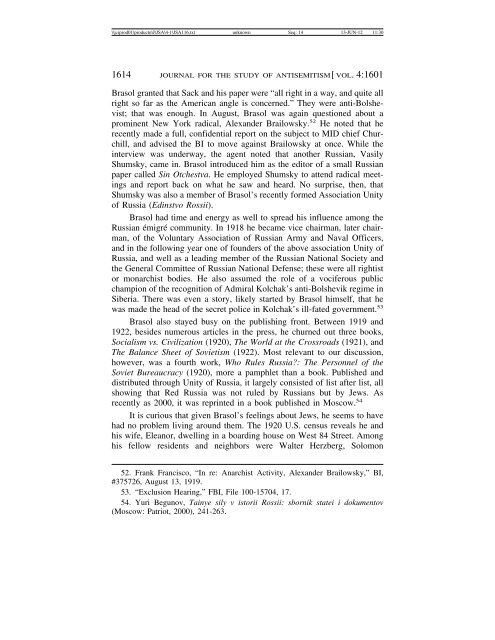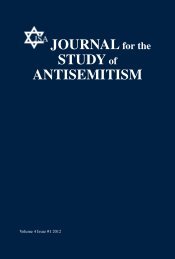The Tsar's Other Lieutenant: The Antisemitic Activities of Boris L ...
The Tsar's Other Lieutenant: The Antisemitic Activities of Boris L ...
The Tsar's Other Lieutenant: The Antisemitic Activities of Boris L ...
Create successful ePaper yourself
Turn your PDF publications into a flip-book with our unique Google optimized e-Paper software.
\\jciprod01\productn\J\JSA\4-1\JSA116.txt unknown Seq: 14 13-JUN-12 11:30<br />
1614 JOURNAL FOR THE STUDY OF ANTISEMITISM[ VOL. 4:1601<br />
Brasol granted that Sack and his paper were “all right in a way, and quite all<br />
right so far as the American angle is concerned.” <strong>The</strong>y were anti-Bolshevist;<br />
that was enough. In August, Brasol was again questioned about a<br />
prominent New York radical, Alexander Brailowsky. 52 He noted that he<br />
recently made a full, confidential report on the subject to MID chief Churchill,<br />
and advised the BI to move against Brailowsky at once. While the<br />
interview was underway, the agent noted that another Russian, Vasily<br />
Shumsky, came in. Brasol introduced him as the editor <strong>of</strong> a small Russian<br />
paper called Sin Otchestva. He employed Shumsky to attend radical meetings<br />
and report back on what he saw and heard. No surprise, then, that<br />
Shumsky was also a member <strong>of</strong> Brasol’s recently formed Association Unity<br />
<strong>of</strong> Russia (Edinstvo Rossii).<br />
Brasol had time and energy as well to spread his influence among the<br />
Russian émigré community. In 1918 he became vice chairman, later chairman,<br />
<strong>of</strong> the Voluntary Association <strong>of</strong> Russian Army and Naval Officers,<br />
and in the following year one <strong>of</strong> founders <strong>of</strong> the above association Unity <strong>of</strong><br />
Russia, and well as a leading member <strong>of</strong> the Russian National Society and<br />
the General Committee <strong>of</strong> Russian National Defense; these were all rightist<br />
or monarchist bodies. He also assumed the role <strong>of</strong> a vociferous public<br />
champion <strong>of</strong> the recognition <strong>of</strong> Admiral Kolchak’s anti-Bolshevik regime in<br />
Siberia. <strong>The</strong>re was even a story, likely started by Brasol himself, that he<br />
was made the head <strong>of</strong> the secret police in Kolchak’s ill-fated government. 53<br />
Brasol also stayed busy on the publishing front. Between 1919 and<br />
1922, besides numerous articles in the press, he churned out three books,<br />
Socialism vs. Civilization (1920), <strong>The</strong> World at the Crossroads (1921), and<br />
<strong>The</strong> Balance Sheet <strong>of</strong> Sovietism (1922). Most relevant to our discussion,<br />
however, was a fourth work, Who Rules Russia?: <strong>The</strong> Personnel <strong>of</strong> the<br />
Soviet Bureaucracy (1920), more a pamphlet than a book. Published and<br />
distributed through Unity <strong>of</strong> Russia, it largely consisted <strong>of</strong> list after list, all<br />
showing that Red Russia was not ruled by Russians but by Jews. As<br />
recently as 2000, it was reprinted in a book published in Moscow. 54<br />
It is curious that given Brasol’s feelings about Jews, he seems to have<br />
had no problem living around them. <strong>The</strong> 1920 U.S. census reveals he and<br />
his wife, Eleanor, dwelling in a boarding house on West 84 Street. Among<br />
his fellow residents and neighbors were Walter Herzberg, Solomon<br />
52. Frank Francisco, “In re: Anarchist Activity, Alexander Brailowsky,” BI,<br />
#375726, August 13, 1919.<br />
53. “Exclusion Hearing,” FBI, File 100-15704, 17.<br />
54. Yuri Begunov, Tainye sily v istorii Rossii: sbornik statei i dokumentov<br />
(Moscow: Patriot, 2000), 241-263.














